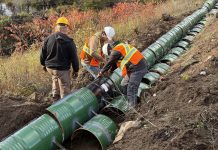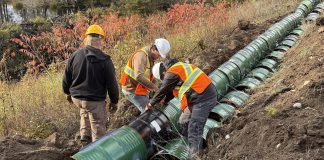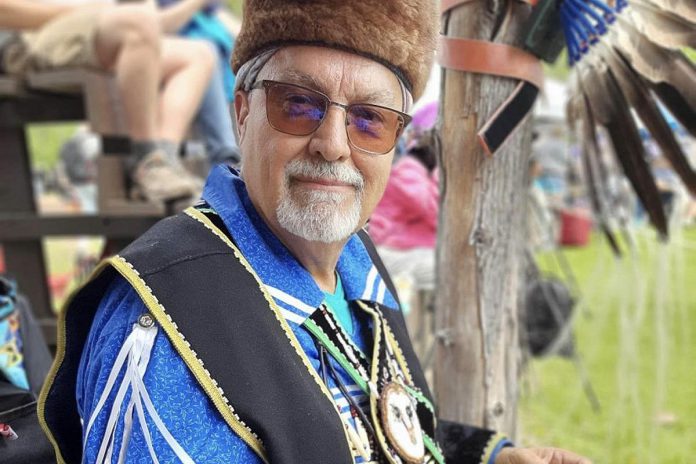
Larry O’Connor might call himself retired, but that hasn’t stopped him from keeping busy. For the past seven years, at 6 p.m. on the last Wednesday of every month, O’Connor can be heard through the airwaves at 100.9 Canoe FM, a not-for-profit community radio station based in the Haliburton Highlands.
On his show Tales from the Big Canoe, O’Connor plays contemporary, modern, and traditional music from Indigenous artists and interviews people from communities across North America.
Though the former politician was the mayor of the township of Brock from 2006 to 2011, upon retirement, he and his wife decided to move to Minden where the couple had been cottaging for years.
Though O’Connor himself is proudly of Anishinaabe (Odawa) Métis and Irish descent and is now a recognized member of the Sheshegwaning First Nation band, there was once a time he had no knowledge of his Indigenous heritage.
Born in Oshawa to a big family of six sisters and three brothers, O’Connor wasn’t taught about his culture during childhood, and it wasn’t until the 1990s that he really began diving into it, as the Métis Nation of Ontario was starting to form. When he — joined by his father and a few siblings — began digging into their family history, he discovered that both his mother and father had Indigeneity in their family lines.
“My folks came from northern Ontario and grew up at a time in the thirties and forties when being Indigenous or being Indian or being ‘half breed’ was something that was frowned upon,” explains O’Connor. “Nobody ever wanted to talk about it, and nobody wanted to admit it. It’s a shame that colonization had placed on all Indigenous people.”
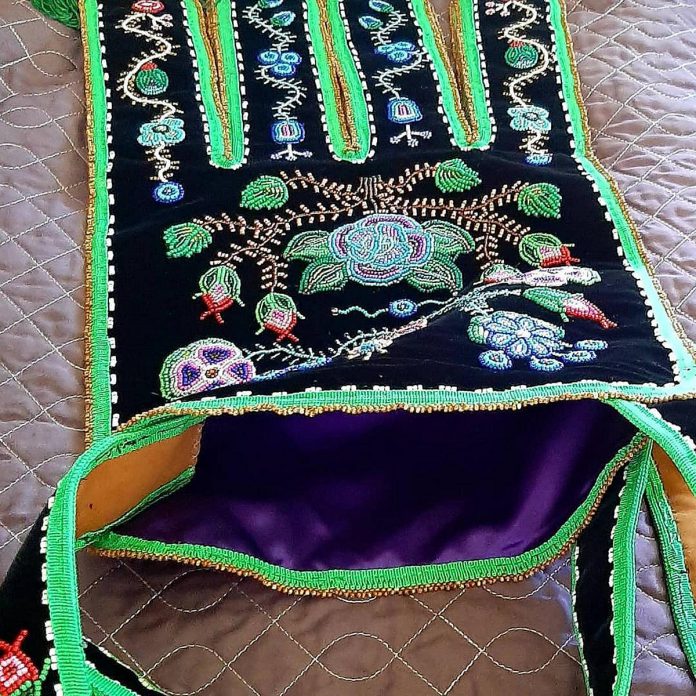
O’Connor traced the family history back to his father’s great-great-grandmother, who they learned was actually an aunt to Louis Riel, the famous Métis leader in western Canada.
“I found it fascinating,” he says. “There’s a little bit of my family history that I didn’t know anything about.”
During this time, anyone who went to post-secondary school was enfranchised from their heritage, stripped of their Indian status.
Like a lot of families, O’Connor’s great-grandmother (who was granted status from her father who was Sheshegwaning First Nation) wanted her children enfranchised so they would, as O’Connor explains, “not be recognized and stigmatized with that heavy guilt of being Indigenous.”
Although O’Connor’s family history was erased, he began to make up for lost time by doing his own research, first looking over the records at the residential school his great-grandmother had attended near Sault St. Marie. This trip, roughly seven years ago, ended up being the first of many O’Connor would take as he dove into his family history, eventually attending events and powwows and meeting distant relatives.
One day, Canoe FM’s station manager Roxanne Casey approached him, suggesting his research would make for a great show.
“I started asking the questions and then I started sharing the answers,” he explains. “Reconciliation doesn’t just happen. It requires an action, so my show is an action and the people listening get to hear the show and participate and that’s an action as well.”
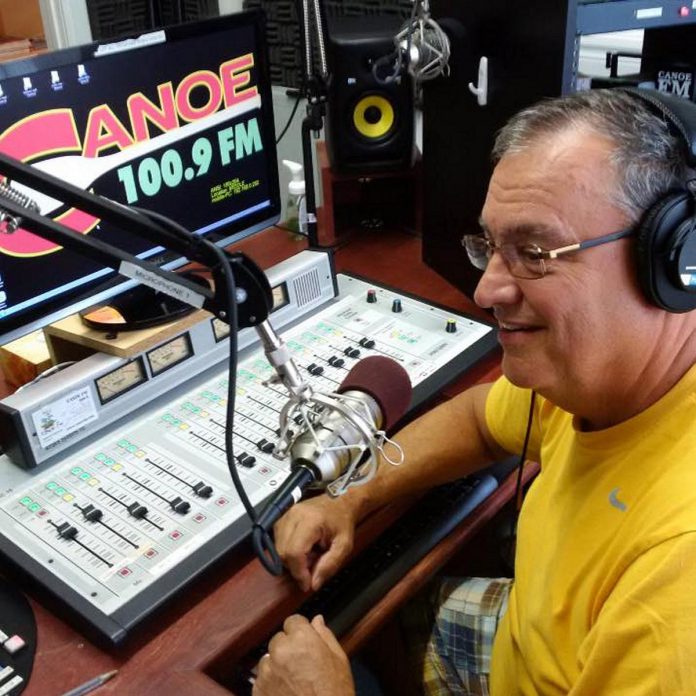
Now, O’Connor says his journey has taken him to meet people “right across Turtle Island,” including basket weavers, drum makers, moccasin weavers, and more. In his seven years since beginning the show, O’Connor has travelled extensively to visit different cultures and share more stories from coast to coast and as far away as Mexico.
“I would never have had a chance to go and visit and share the information unless my show pushed me in that that direction,” O’Connor admits. “So, I get some really neat teachings that I get to go and see and then be able to share.”
For O’Connor, sharing the stories he learns helps him to connect with his own culture.
“My interest and curiosity just keeps growing,” he explains. “And because I didn’t grow up in the culture, I feel like I’ve got so much to learn.”
To further share his experience and teachings, O’Connor is a knowledge holder for the Trillium Lakelands District School Board, and often speaks to students in the classroom. He explains that he’s very “humbled” being able to talk about his culture after his family and other Indigenous people felt ashamed of their histories for so long.
“Their smiles and their attention and their enthusiasm to learn is just phenomenal — I can see that their teachers are making a difference,” he says, adding that the curriculum in schools now include Indigenous authors and more history about residential schools and colonial impacts.
“I’m not offering something from a textbook. I’m offering them something from the learned knowledge that I have and, though it may be fresh knowledge for me, it’s important to share.”
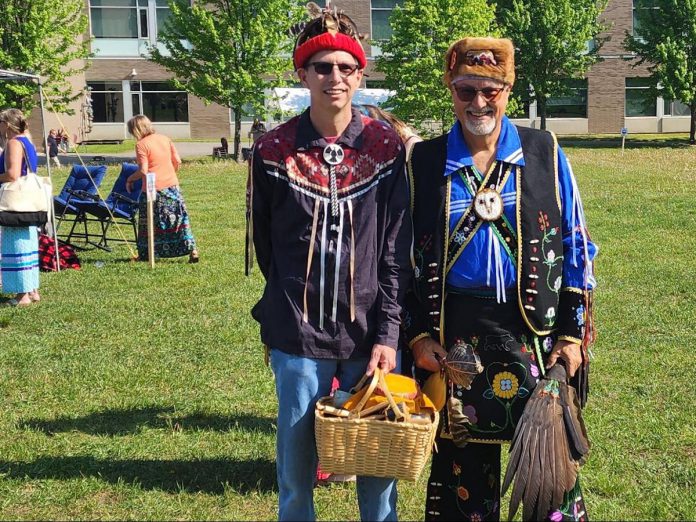
O’Connor often connects to his students through his beadwork, a traditional art form he picked up during COVID lockdowns. He says he was immediately “hooked” on the hobby and now shares it by telling stories behind his creations, which include cuffs, octopus bags, and wooden-style regalia.
“I’ll chat to them about some of my history (and) some of the knowledge that I’m picking up and that I can share,” he explains. “Because that’s how our language evolved and how our culture evolved. It’s all about sharing — we shared our culture, we shared our legends, we shared our stories, we shared our teachings and I find that remarkable and I still do that now.”
O’Connor says there are now almost 650 children and youth in Trillium Lakelands District School Board who are self-declaring as Indigenous.
“We have an Indigenous student success team at the school board and they’re out spending a little bit of time with each of these young students, and they want to make sure that they succeed and that they’re given as much opportunity as they can to learn about their culture,” explains O’Connor, adding that a lot of the students are disconnected from their Indigenous communities and aren’t necessarily learning about their heritage at home.
O’Connor admits he’s also still constantly learning and, in doing so, he will continue to share his findings, whether through his beading, the radio show, or in the classroom. But, he says, there’s always more that needs to be done.
“There are so many things that are a direct relationship to Canada’s past history that need to be talked about,” he point out. “This is something that’s going to take years of conversation, and the conversation is not meant to place guilt on anyone. It’s meant to enlighten and acknowledge and move forward. (Indigenous) culture has a lot of amazing pieces to it, and I’m learning more all the time and I want to share that.”
For more information about O’Connor’s show Tales from the Big Canoe and to listen to past episodes, visit canoefm.com/listen/recorded-programs/tales-from-the-big-canoe/.


